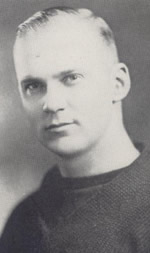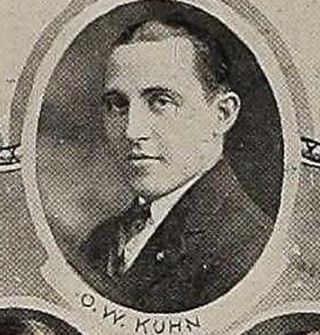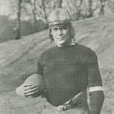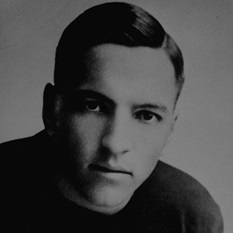
John William Heisman was a player and coach of American football, baseball, and basketball, as well as a sportswriter and actor. He served as the head football coach at Oberlin College, Buchtel College, Auburn University, Clemson University, Georgia Tech, the University of Pennsylvania, Washington & Jefferson College, and Rice University, compiling a career college football record of 186–70–18.

Robert Lynn Bomar was an American football end in the National Football League (NFL). Bomar played college football, basketball and baseball for Vanderbilt University, following coach Wallace Wade and classmate Hek Wakefield there from prep school, and was a unanimous 1922 All-Southern selection and a consensus 1923 All-American selection in football. The latter season included a first-team All-American selection by Walter Camp, rare for a player in the South. A paralyzing injury ended Bomar's college career, but he quickly recovered and sat on the bench for all of his team's games. He played for the New York Giants in 1925 and 1926, retiring abruptly after a separate injury. Bomar was nicknamed "the Blonde Bear".

The Southern Intercollegiate Athletic Association (SIAA) was one of the first collegiate athletic conferences in the United States. Twenty-seven of the current Division I FBS football programs were members of this conference at some point, as were at least 19 other schools. Every member of the current Southeastern Conference except Arkansas and Missouri, as well as six of the 15 current members of the Atlantic Coast Conference plus future SEC member University of Texas at Austin, currently of the Big 12 Conference, formerly held membership in the SIAA.

Oliver Wall Kuhn, nicknamed "Doc Kuhn", was an American football, baseball and basketball player for the Vanderbilt University Commodores and later a prominent businessman of Tampa, Florida. As a college football quarterback, Kuhn led Vanderbilt to three consecutive Southern titles in 1921, 1922, and 1923 – the most-recent conference titles for Vanderbilt football. In 1922, Vanderbilt tied Michigan at the dedication of Dudley Field, and Kuhn was picked for Walter Camp's list of names worthy of mention and Billy Evans' All-America "National Honor Roll."

The 1917 College Football All-Southern Team consists of American football players selected to the College Football All-Southern Teams selected by various organizations for the 1917 Southern Intercollegiate Athletic Association football season. Georgia Tech won the SIAA and the south's first national championship. Walker Carpenter and Everett Strupper were the first two players from the Deep South selected first-team All-American.

The 1921 College Football All-Southern Team consists of American football players selected to the College Football All-Southern Teams selected by various organizations for the 1921 Southern Intercollegiate Athletic Association football season. This was the last year before many schools left the Southern Intercollegiate Athletic Association (SIAA) for the Southern Conference (SoCon).

The 1916 College Football All-Southern Team consists of American football players selected to the College Football All-Southern Teams selected by various organizations in 1916.

The 1915 College Football All-Southern Team consists of American football players selected to the College Football All-Southern Teams selected by various organizations in 1915. Josh Cody and Baby Taylor were selected third-team All-Americans by Walter Camp, and Bully Van de Graaff was selected for his second-team. Van de Graaff was Alabama's first ever All-American. Buck Mayer of the 8–1 Virginia Cavaliers was the south's first consensus All-American, selected first-team All-American by Frank G. Menke and Parke H. Davis. The "point-a-minute" Vanderbilt Commodores won the SIAA.
The 1914 College Football All-Southern Team consists of American football players selected to the College Football All-Southern Teams selected by various organizations for the 1914 Southern Intercollegiate Athletic Association football season.

The 1922 College Football All-Southern Team consists of college football players chosen by various organizations and writers for College Football All-Southern Teams for the 1922 Southern Conference football season. It was the first season of the Southern Conference.

The 1913 College Football All-Southern Team consists of American football players selected to the College Football All-Southern Teams selected by various organizations for the 1913 Southern Intercollegiate Athletic Association football season.

The 1912 College Football All-Southern Team consists of American football players selected to the College Football All-Southern Teams selected by various organizations for the 1912 Southern Intercollegiate Athletic Association football season. Lew Hardage was selected for Walter Camp's third-team All-American. Vanderbilt won the SIAA championship. Georgetown won the SAIAA championship.

The 1909 College Football All-Southern Team consists of American football players selected to the College Football All-Southern Teams selected by various organizations for the 1909 Southern Intercollegiate Athletic Association football season. Sewanee won the SIAA championship. VPI, an independent school, also claims a Southern championship.

The 1908 College Football All-Southern Team consists of American football players selected to the College Football All-Southern Teams selected by various organizations for the 1908 Southern Intercollegiate Athletic Association football season.

The 1907 College Football All-Southern Team consists of American football players selected to the College Football All-Southern Teams selected by various organizations for the 1907 Southern Intercollegiate Athletic Association football season. Fielding Yost selected Bob Blake for his All-America first team. Vanderbilt won the SIAA championship.

The 1906 College Football All-Southern Team consists of American football players selected to the College Football All-Southern Teams selected by various organizations for the 1906 Southern Intercollegiate Athletic Association football season. For some, the SIAA champion 1906 Vanderbilt Commodores football team made up the entire team. It would produce eight of the composite eleven. Owsley Manier was selected by Walter Camp third-team All-American. Vanderbilt won the SIAA championship.

The 1905 College Football All-Southern Team consists of American football players selected to the College Football All-Southern Teams selected by various organizations for the 1905 Southern Intercollegiate Athletic Association football season. Vanderbilt won the SIAA championship. Virginia Tech, an independent school, lost only to Navy and claims a southern championship for 1905.

The 1904 College Football All-Southern Team consists of American football players selected to the College Football All-Southern Teams selected by various organizations for the 1904 Southern Intercollegiate Athletic Association football season.
The 1917 Southern Intercollegiate Athletic Association football season was the college football games played by the member schools of the Southern Intercollegiate Athletic Association as part of the 1917 college football season. The season began on September 28. A curtailing of expenses was required for extension into 1918.
The 1922 Southern Conference football season was the college football games played by the member schools of the Southern Conference as part of the 1922 college football season. The season began on September 23 as part of the 1922 college football season. Conference play began on October 7 with Washington & Lee defeating North Carolina State 14–6 in Lexington.




















